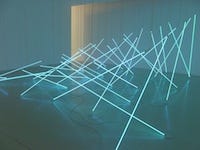Connections between everything
In one of my essays applying to graduate school--I can't remember if it was the one that was successful or the one that wasn't--I wrote about how I saw connections between everything. If I was thinking about something intensely, I would see it refracted all over, tiny prisms everywhere illuminating different aspects of my current obsession.
I realize now that I’m not special in this experience. It’s a frequency illusion, sometimes called the Baader-Meinhof phenomenon. That feeling you get when you first learn about something and then you see it everywhere. Or when you imagine connections between everything around you. I didn’t know what it was called then (I’m beginning to think this was the unsuccessful application) but I knew that I enjoyed the feeling. I imagined it would be useful in grad school, somehow.
And it was. Exploring connections between everything is one way to forge a research path. I find even more enjoyable now that I’m out of grad school (which anxiety and poverty make difficult to enjoy even in the best of circumstances) and learned to trust myself more on what I see. I’ve made a career out of leaning into these connections, even seemingly disparate ones, particularly between computational technologies and writing.
I went to grad school in English—Literature at first, and then the lesser-known field of Composition and Rhetoric, which is focused less on authors and more on the study of everyday writers and writing in general. I was less invested in writing’s artistic potential and more interested in how writing worked in the world. I had come for my PhD after a short stint as a secretary in a video game company where, to stay awake during my tedious HR and phone-answering duties, I learned some IT and computer programming. When my grad classes taught me how literacy functioned socially and historically, I saw a refraction of what I’d learned about programming. Both writing and programming were technologies of communication, information, and ordering the world.
This connection formed the basis of my first book, Coding Literacy: How Computer Programming is Changing Writing, published by MIT Press in 2017. When I was researching the connections between writing and programming, I learned—of course—that I was far from the first one to make them. Alan Perlis, John Kemeny, Seymour Papert, and many others made this link as they argued for programming to be taught more broadly in the 1960s, ‘70s and ‘80s. As my book was coming out in the mid-2010s, this connection was resurrected by the “everyone should learn to code” arguments exemplified by Code.org and their successful Hour of Code initiative.
These computer scientists saw the same parallels I did between programming and writing, and the need to have such skills broadly learned and taught. But what they hadn’t done was dive deep into the history of writing, of literacy, and of programming to fully explore what those connections meant. That was my angle. And I’m grateful that a number of computer scientists as well as writing researchers have found my take on programming as literacy useful.
Deep diving into connections is core to my research—and to any kind of research, I think. You see an interesting link: what can we learn from it? Where can we trace it back or follow it forward? What does this connection mean? Answering these questions, especially across disciplines, means being an omnivorous reader, talking to others to check assumptions, and reflecting simultaneously on the big picture and the little details. This process is one of my favorite things about being a researcher.
But being a researcher at a research university also necessitates publishing in venues where my work is scrutinized and validated by my peers. This is generally a good thing. Yet it’s also a slow process with a high bar for having all of the i’s dotted, all preceding scholarship properly cited and formatted, and tailoring an argument to the niche audience a publication represents. Twelve years into a faculty career and four years post-tenure, I know the value of the process. But I also want to be able to write more, quickly, and without always asking permission. I trust myself and want to write on timely topics. The irony of being a writing researcher at my stage of career is that most of the writing I do is not research but instead emails, rec letters, and comments on other people’s work.
So, here I am, in a little (online) room of my own, hoping to write about connections in inchoate form and to meet others doing the same.



